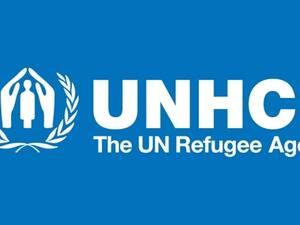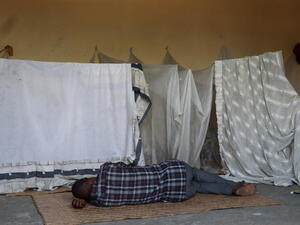Growing number of Mozambicans flee to Malawi
Growing number of Mozambicans flee to Malawi

A Mozambican family is registered by UNHCR staff at the Kapise site, Malawi.
KAPISE, Malawi, March 16 (UNHCR) - When government soldiers hunting opposition Mozambican National Resistance, or RENAMO, fighters ransacked his village, Carlos Songane* and his family ran for their lives.
"The soldiers wanted us to disclose the whereabouts of the RENAMO soldiers," says Songane, speaking in Chichewa, the local dialect. "When you tell them you don't know, they torture you. So, most of us fled to Malawi for safety."
The farmer, his wife and four children fled their home Kondezi in western Tete Province in February for this site in Malawi's Mwanza district. They are among some 9,600 registered asylum seekers who have run from what they say is worsening violence in Mozambique in the past nine months. Scores more have not yet been registered and their inclusion would bring the total of arrivals to almost 11,500.
Among the wave of recent arrivals is Paolo Chirindza*, 56, who recently abandoned the village of Sabwe in Tete, with his wife and two children after soldiers burned down his home, following accusations that he was among villagers harbouring RENAMO fighters.
"We had to run for our lives," he recalls, explaining how the family fled on foot with their neighbours - among them women with children and babies. The trek to Malawi took three days, taking them through other ransacked, torched and abandoned villages on the way.
While many like Songane and Chirindza have fled violence, others have left Mozambique as a precautionary measure, reportedly concerned that there could be more fighting after RENAMO this month threatened to take control of six northern provinces - Manica, Sofala, Tete, Zambezia, Nampula and Niassa.
In the past three weeks, an estimated 250 people have been arriving in Kapise every day, compared to about 130 a day before. Most arrive empty handed, while some managed to flee with a few blankets and pots.
The sharp upsurge in needy new arrivals is placing pressure on the local community in Kapise, who so far have graciously received the Mozambicans, but warn that it is getting more difficult as the local resources are insufficient to support them all.
"We welcome our brothers and sisters in the true spirit of African generosity because they are in trouble," said Kapise village chief, William Mitiwe. "However, there has been a lot of pressure on our land, forest and general vegetation. Trees had to be cut down to host these people, and the fruits we enjoy during the rainy season are all gone."
To cope with the growing number of arrivals and the difficult conditions at Kapise, as well as for security reasons, the Malawi government agreed last Friday to reopen Luwani refugee camp, where basic services can be better guaranteed. While Kapise is just five kilometres from the border, Luwani is some 65 kilometres inside Malawi.
Luwani camp previously hosted Mozambican refugees during the 1977-1992 civil war and was finally closed in 2007. Preparations are under way for the move, which UNHCR hopes to start in the coming few weeks.
Several partners, including UNICEF, WFP and MSF, have provided essential services in Kapise, such as water boreholes, food and health care, which has helped to improve life in Kapise, but conditions generally remain tough and so it will be used mainly as a transit camp.
"We have engaged the government to ensure that a piece of land big enough to accommodate the new arrivals is provided, and as UNHCR we are happy, and wish to commend the government for positively responding to our request," says UNHCR Representative to Malawi Monique Ekoko.
Malawi already hosts some 25,000 refugees, mostly from the Great Lakes region and the Horn of Africa, in Dzaleka camp located some 35 kilometres from Lilongwe. This camp is already stretched to capacity and with food rations being reduced to 40 per cent since October last year, resources to assist refugees are limited.
*Name changed for protection reasons
By Kelvin Shimo in Kapise, Malawi








